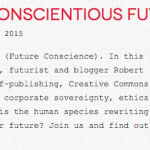Last month I had the pleasure of being a guest speaker on the Robot Overlordz podcast, an experience I enjoyed so much that I thought it would be great to return the favour and ask them a few questions about the current state of futurist thinking and where the community might be headed next.

FC: Tell us a little bit about yourselves, what brought you together to do the podcast?
Mike Johnston: I’ve been a fan of science fiction and technology ever since I can remember. But one thing that actually led to the formation of the podcast was a book that I was given, probably when I was about 8 or 9, called The Kids’ Whole Future Catalog. It was set up very similar to the Whole Earth Catalog, but it was filled with all of this info about the possible futures and how society was changing (and would change), along with handy resources for how to find out more or get involved. That book really influenced me personally. It was the first place I heard terms like computer network, email, virtual worlds, smart homes, and much much more. That interest in the future and technology led me to my career in Information Technology. It’s been 20 plus years now in that field and I still love the possibilities. Working in that space exposes you to so many different possibilities. When I first heard about podcasting, I was immediately interested (I’d been a DJ on college radio way back). Matt and I have known each other since junior high, although there was a period there were we weren’t in contact. It was actually the Internet that reconnected us (MySpace in fact) and when I was talking about podcasting, we came up with the idea for Robot Overlordz. Tried to get it going back in 2011, hit some snags in early 2012 that led to it being suspended but in January 2014 we picked it back up and have been doing two episodes a week ever since (except for the holidays).
Matt Bolton: The podcast was Mike’s idea and I thought it sounded like a lot of fun. My background is in marketing, so I wasn’t as familiar with this whole genre when we started. Since doing the podcast I’ve become a lot more interested and I’ve learned a lot just from researching the topics before each show. I’ve also learned a lot from Mike, who has been a fan of this topic for a lot of years. I like to think of myself as bringing more of an every man voice to the conversation. I don’t profess to be a science fiction geek or anything like, but I’d like to think I can let people who aren’t into futurist thinking, know how this stuff effects them from the layman’s perspective.
FC: Futurist thinking is growing in popularity, do you think this is because we are recognising that an era defining transition is taking place – or is there something else behind it?
MB: One of the reasons I think futurist thinking is becoming more popular is that the speed of the technology is increasing so fast that you can almost watch it happen in real time. 10 years ago smart phones were very rare, with the exception of Blackberry’s and that was just to answer emails and do some very basic things. Now we have phones that are almost as powerful as desktop computers and can do almost as much. 20 years ago the very first movie website went live (Stargate), before that no movie had ever had its own website. Technology has increased more in the last 100 years, than all of previous years humans have been on the planet combined. Things are moving so quickly and with the all of the information you can sort of see what direction things are moving in, something not possible in decades past. If you look at futurists from the turn of the century and even into 40’s and 50’s, their predictions are very different from what we are actually seeing. Now with the internet, you can read about what all of these tech companies are doing, in real time. We live in an age where for the first time in human history, we have access to all of the knowledge in the world at our fingertips. If you think about that for a minute it’s truly amazing, we have instant access to basically all of the knowledge in the world. As this information becomes available to an ever increasing world population the technology will continue to increase. Trying to make sense of all of this and watching these events unfold faster and faster is probably why you see an increase in the number of futurists.
MJ: I totally agree with Matt on this, it’s really an amazing time to be alive. What gets me sometimes is how blasé we’ve become about this and how negative the media or our idea of how things are can be. I’m just blown away by the advances we’ve made and I’d just add I think one reason that futurist thinking is growing in popularity is that we as a species are starting to have a real sense that this is tricky territory and we need to start looking ahead to navigate it properly. Just blindly running forward is potentially the way to disaster. As our reach has grown, so to has our capability to ruin things. So I’m incredibly optimistic that futurist thinking is becoming more popular and I hope in our little way we help to encourage that, even when we’re a bit curmudgeonly on some of the specifics that society seems to be treading down.
FC: You’ve managed to have some truly leading voices on your podcast over the last few years. Who are some of your favourites, and why?
MJ: It’s really difficult to pick, because I think each of the people we’ve had on brings something unique and valuable. Obviously sometimes for whatever reason it doesn’t entirely click, but overall we’ve had so many great guests. I’ve had a particularly good time talking with two of our recurring guests, Kate Aquino (Miss Metaverse) and Heather Schlegel (heathervescent). Kate was one of our first recurring guests actually. She always brings a very unique and positive perspective to thinking about the future. She’s also very active in the overall “future interested” community. She’s also got a very “internet-esque” attitude, that whole “learn while doing”/“DIY” mentality that has seen so many positive iterations online. Heather brings a very rigorous, more professional-oriented futurist/strategic foresight background to the question of the future. I’m always amazed at the insights she brings, while keeping things very grounded. I could go on and on about both of them, that’s really why they’ve been some of our “go to” guests and there are so many more. We actually did an entire episode on past guests as a way of looking at this exact question (episode 158 – Behind The Curtain 2). Since that episode, we’ve had even more great guests. For myself personally, I had an especially good time recently talking with Arthur Zards, the organizer of TEDxNaperville. From that conversation, we actually ended up demoing the Oculus Rift at the 2015 TEDxNaperville event (which was a total blast). Well, and having been a guest yourself, you’ve seen up close how we work, on the episodes. It was great for us talking through these kinds of issues with you…and I think we have similar stories/experiences with just about every guest.
MB: We’ve had some truly amazing guests on the show, Mike’s been great about finding some really interesting people to talk to. A few of my favorites were Peter Bishop (in episode #180 – FutureSchool), I loved the idea of having a high school or college class that makes you think about the future. I agree with Mike, Kate Aquino (Miss Metaverse) and Heather Schlegel (heathervescent) have both been excellent guests and it’s been great having a unique female perspective on the show. I think we normally think about futurists as geeky males, so it’s nice to see that isn’t always true. Lenore Skenazy was another favorite guest, she talked about free range kids and I loved the topic. It was amazing how much parenting has changed since we were kids and made me realize how lucky I was not to grow up now. My final favorite guest had nothing to do with the future, it was an actor named Desmin Borges from one of my favorite TV shows. It was fun to just geek out a bit and talk about a TV show that I love.
FC: Thinking about the futurist community more broadly, are there any aspects of it that you feel need to be improved or are a negative?
MB: In one word education. We had one of my favorite guests on, that was a futurist professor I just mentioned, Peter Bishop. He taught a class that got students thinking and predicting the future. I think that type of class has many benefits for the student as well as society as a whole. We put so much emphasis on what has happened in the past (history classes), but nothing to help us predict what we might face in the future. I think history classes are extremely important and should always be taught, but why not futurist thinking as well. We aren’t going back to the past, but we are headed to the future and taking classes to help us predict what will be there would be a great benefit. We always credit Star Trek with helping invent new devices, people saw something on Star Trek and tried to make it a reality (flip phones). I think if we got high school and college age students to start thinking about what they would like to see in the future and ideas they have for the future, it might help make those ideas a reality. Hopefully that Star Trek analogy made some sense, when people see or envision something, it helps them make that a reality.
MJ: Definitely! Personally I think Gene Roddenberry’s vision is a perfect example of how futurist thinking can led us forward into a world that works for everyone. It’s just how we get there. I think the community needs to be more engaging of everyone, of reaching out both to ordinary people and to each other. One of my own personal frustrations on the Internet is how easily people slip into a hoarding mentality and don’t help others spread the word about what they’re doing. I think some of that is still rooted in the scarcity approach that has dominated so much of human life over the centuries…but as we transition to more of an abundance model, I hope that will change. Certainly for us on the podcast, we love talking to new people and making connections. That’s actually something I’d like to work on more, developing a little more of a community for our show and people that are interested in this. There’s a great community on Twitter, and that’s been huge for us personally as we work on growing the show.
FC: What are two or three key issues that you think we’ll need to facilitate or overcome during the 21st Century?
MJ: I think one of the biggest issues is coming up with better systems for how we manage problems. There’s so been so much technological innovation, but our human decision-making systems still lag so far behind. Matt and I spend a lot of time talking about politics, and that’s a perfect example. There’s such a disconnect between our leadership and our politics with how these technological systems work and the best ways to make them inclusive for everyone (and not just the big companies that dominate). It’s both encouraging and incredibly worrying…all the potential that we could see, and the unfortunate short-term interests that stand in the way of fully realizing that potential. That’s one of the reasons we care about things like net neutrality and the Trans-Pacific Partnership (TPP) treaty. I think there are so many great ideas out there for how to do this better…now we just need people to get on board with them and push those forward.
MB: Totally agree with Mike on this one. We have so much potential as a species and the internet and technology is moving so fast right now. I think the only thing that could slow us down is something like the TPP or some other form of internet censorship. We’ve built this wonderful tool that puts every person on an equal footing and is bringing free speech to places that have never enjoyed that freedom. Yet everyday I hear about how some proposed law is trying to take that away or at least slow it down or censor it. We need to be ever vigilant that this never happens, because the powers that be are never going to stop trying to destroy it. I know that probably sounds overly dramatic, but I think it is that important.
FC: What’s next for the Robot Overlordz?
MJ: Looking ahead to 2016, I think we’re really just looking to continue expanding out, making connections with the overall community that is interested in this stuff and to grow a stronger community around our own show too. That’s one area that we’re still feeling our way into. Like I said, we’re pretty active on Twitter, and that’s really been a great resource for us on this kind of thing, but at some point it’s always nice to have something that’s more your own, that’s less dependent on the actions/ethics of a corporation. So one of the big things that I’m looking to do is revise and streamline some things to free up time to spend on that community cultivation aspect. We’ve been so focused on the show itself for the first two years…it definitely feels like it’s time to do that and I’d also like to revisit some of our past guests that we haven’t talked with in a while, I’ve got quite a list of those going at the moment. Finally, as always, we’re looking for new guests and connections, and can’t wait to get into the weeds more on the future itself, as more and more of the stuff we’ve been talking about becomes a part of people’s daily lives.
If you haven’t done so already, make sure to check out the Robot Overlordz podcast for some excellent twice-weekly futurist discussion and debate! Whilst you’re over there, listen to Episode 224: Conscientious Futures to hear more about privacy, transhumanism, corporate sovereignty, and self-publishing my debut novel When Winter Calls.





